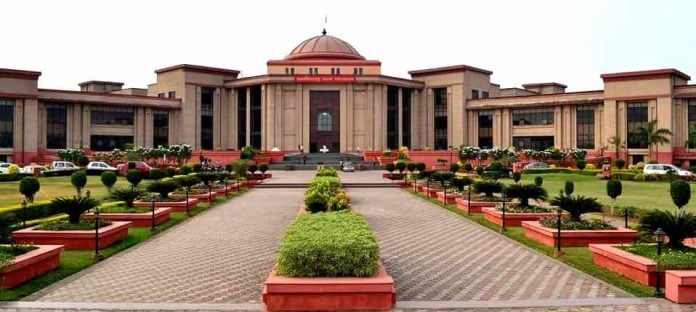The Chhattisgarh High Court dismissed a Public Interest Litigation (PIL) filed seeking direction to the private respondent to follow the guidelines while doing a mining project so that innocent villagers should not suffer who are residing nearby the mines which are operated by the private respondent.
Gaurav Singhal submitted that the respondent No. 3 (Private Respondent) has been allotted forest land in village Chotadonger, District Narayanpur for the purpose of mining and extracting iron ore on lease with certain conditions. The respondent No. 3 is causing irreparable damage to the flora and fauna of the area and is disposing of the toxic waste by throwing it in the Madin river which is 20 meters away from the said mines. As per the terms and conditions of the mining lease, the respondent No. 3 cannot do any mining activity near the public places, however, the respondent No. 3 in gross violation of the terms and conditions, is doing mining activity in the places near the Hospitals, Railway Station Etc. It is further submitted that respondent No. 3 has cut down 11,500 trees in the mining area and as per the agreement, it was to compensate the loss of trees by planting news trees which it has failed to do.
On the other hand, Chandresh Shrivastava, State counsel would oppose the present public interest litigation petition and submit that the same lacks substance and deserves to be dismissed at the threshold. He would rely on the affidavit filed on 02.05.2023.
Tushar Dhar Diwan, Standing Counsel for the Union of India submits that no direct relief has been claimed against the Union of India and all the relief are in respect of the State Government.
The Court vide order dated 02.05.2023 had directed the learned Additional Advocate General to file personal affidavit of respondent No. 2 (State Of Chhattisgarh) regarding the allegations made in the writ petition. In compliance with the same, the State has filed an affidavit dated 15.06.2023 sworn by the Special Secretary (Independent) Department of Mineral Resources, Government of Chhattisgarh.
In the said affidavit, it is stated that the mining activities are being carried out by respondent No. 3 which is at a distance of 3 KMs from Mandin River. The trucks which are transporting iron ore are properly covered so as to curb the air pollution and water is also sprinkled in the roads so that dust particles do not cause air pollution. The respondent No. 3 has also provided ambulances for the villagers and camps are also organised for their checkups and in an area of 71.480 hectares, total 94,471 trees have been planted. The local public around 235 in numbers have also been provided employment. The sum and substance of the affidavit filed by the State is that none of the allegations levelled against the respondent No. 3 is correct and all the measures are being taken by the State to see that the respondent No. 3 operates the mines as per the guidelines/conditions and no injury is either caused to the public or the environment.
From perusal of the pleadings made in the petition, the Division Bench of Chief Justice Ramesh Sinha and Justice Rajani Dubey noted that the petitioner has made merely bald allegations and no material has been produced to establish the same. On the other hand, the affidavit filed by the State in clear terms suggests that the mining activities are being carried out by the respondent No. 3 following the terms and conditions imposed upon them by the State. Even the local people of the vicinity are getting employment in the said mines. The allegations with regard to causing air and water pollution is also found to be incorrect.
The High Court held that it is the duty of the Court to ensure that there is no personal gain, private motive and oblique notice behind filing of PIL. In order to preserve the purity and sanctity of the PIL, the Courts must encourage genuine and bonafide PIL and effectively discourage and curb the PIL filed for extraneous considerations.
“The Courts should, prima facie, verify the credentials of the petitioner before entertaining a PIL. It is also well settled that the Courts before entertaining the PIL should ensure that the PIL is aimed at redressal of genuine public harm or public injury. The Courts should ensure the jurisdiction in public interest is invoked for genuine purposes by persons who have bona fide credentials and who do not seek to espouse or pursue any extraneous object. Otherwise, the jurisdiction in public interest can become a source of misuse by private persons seeking to pursue their own vested interests’, the order reads.


